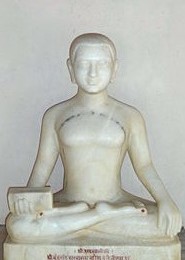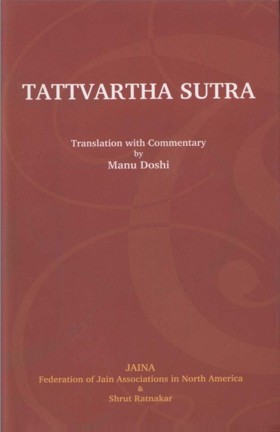05.17 Gatisthityupagraho Dharmādharmayorupakārah
Audio: Sanskrit: गतिस्थित्युपग्रहो धर्माधर्मयोरुपकार: ।
Hindi: गति और स्थिति में निमित्त बनना क्रमशः धर्म और अधर्म द्रव्यों का कार्य है।
05.18 Ākāshasyavagāhah
Audio: Sanskrit: आकाशस्यावगाह: ।
Hindi: अवकाश में निमित्त होना आकाश का कार्य है।
05.19 Shareervāngmanahprānāpānah Pudgalānām
Audio: Sanskrit: शरीरवाङ्मन:प्राणापाना: पुद्गलानाम् ।
Hindi: शरीर, वाणी, मन, नि:श्वास और उच्छ्वास ये पुद्गलों के उपकार (कार्य) हैं।
05.20 Sukhaduhkhjeevitmaranopagrahāshcha
Audio: Sanskrit: सुखदुःखजीवितमरणोपग्रहाश्च ।
Hindi: सुख, दुःख, जीवन और मरण भी पुद्गलों के उपकार हैं।
05.21 Parasparopagraho Jeevānām
Audio: Sanskrit: परस्परोपग्रहो जीवानाम् ।
Hindi: परस्पर के कार्य में निमित्त (सहायक) होना जीवों का उपकार है।
05.22 Vartanā Parināmah Kriyā Paratvāpararve Cha Kālasya
Audio: Sanskrit: वर्तना परिणाम: क्रिया परत्वापरत्वे च कालस्य ।
Hindi: वर्तना, परिणाम, क्रिया और परत्व-अपरत्व ये काल के उपकार हैं।
05.17-22
English: These sutras deal with the functions of different substances. They also relate to the impact of one substance upon another. The term used for the purpose is Upakār, which normally denotes benevolent help, but here it is used in the sense of the positive or negative impact of one substance or object upon another. It is easy to make out such impact, when a substance is tangible. Here, however, we have to deal with mostly intangible substances. The functions of such intangible substances can be laid on the basis of their properties.
The term 'property' needs to be defined here. It is generally taken as equivalent to attribute, but the two terms have different connotations. Property relates to the inherent qualities. For instance, giving light is the property of a lamp. That property always stays with it and cannot be separated from that. In spiritual terminology, such inseparable properties are termed as Guna. On the other hand, attribute relates to the qualities that can be acquired or given up. For instance, virtue is an attribute. One can acquire and develop some virtue, but he can also give it up and become vicious.
As explained above, Jeev and Pudgal are imbibed with mobility and Dharmāstikāy and Adharmāstikāy have the properties of being instrumental in their movement and in remaining steady. Sutra 17 therefore specifies the function of becoming instrumental as their Upakār upon Jeev and Pudgal. Similarly, it is the property of Ākāsh to give space to other substances. Sutra 18 therefore specifies it as Upakār of Akāsh.
Pudgal being tangible, its impact on others can be laid in terms of its functions. Sutras 19 and 20 mention Skandhas like body, speech, mind, inhaling, exhaling, pleasure, pain, life and death as the functions of Pudgal. As stated in chapter 2, there are five types of bodies. Of these organic, protean and carrier bodies are obviously made of Pudgal- The lustrous and Kārman bodies are subtle, but they are also made of fine particles of light and Karma. They are therefore Pudgal, even though their particles are not visible.
Similarly speech and mind are constituted of subtle particles of sound and thought. Inhaling and exhaling constitute the respiration. That involves air and the respiratory system, both of which are Pudgal. Pleasure and pain are experienced within the body and are therefore Pudgal. Birth and death, though not noticed by the person concerned, can be witnessed by the people around and are therefore Pudgal. These are some examples of Pudgal's functions, in general, it can be said that whatever impact arises on Jeev by virtue of its interaction with Pudgal can be considered the function or Upakār of Pudgal.
Sutra 21 states that Jeevs are mutually helpful. The term 'Jeev' is not used here in the sense of soul without body; it is used in the sense of an embodied soul. Sutra therefore conveys that the living beings are interdependent. This is a well-known maxim and is quoted as a precept of Jainism. The interdependence among human beings is evident; that of humans and animals is also obvious. Our dependence on minute beings like bacteria also is now known. Many of our requirements are provided by such minute beings. In return we happen to raise the conditions in which such minute beings thrive. As such, it is said here that the living beings are interdependent.
Sutra 22 specifies becoming, changing, moving and concepts of" before and after as the functions of time. Becoming, changing and moving are actually the activities of Jeev and Pudgal, but the time when such situations occur is of significance. Time is thus a vital factor for any activity. Similarly the concepts, 'before and after' would not arise in absence of time. Time being instrumental in those activities, they are termed here as the functions or Upakārs of time.
 Acharya Umaswati
Acharya Umaswati
